
Бесплатный фрагмент - English Grammar
Существительное — The Noun
Имя существительное — часть речи, которая обозначает предмет и отвечает на вопросы: Who is this? и What is this?
Существительные бывают:
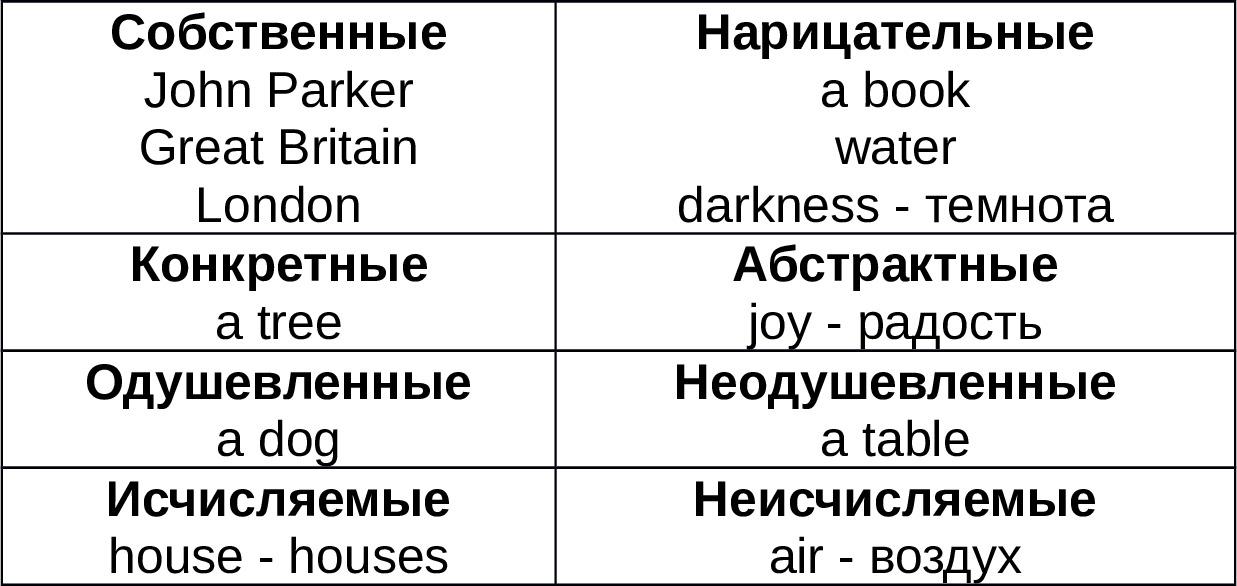
Число существительных
Существительное имеет единственное и множественное число:
a pencil — pencils (карандаш — карандаши)
Множественное число образуется путем прибавления окончания –s или –es к существительному в единственном числе:
a map — maps (карта — карты)
a glass — glasses (стакан — стаканы)
Окончание множественного числа читается:

1) К существительным, оканчивающимся на шипящие (-s; -ss; -x; -sh; -ch; -tch), добавляется окончание –es.
a box — boxes
a watch — watches
2) Если существительное оканчивается на –y с предшествующей согласной, то –y меняется на –i:
baby — babies.
Если перед –y стоит гласная, то –y не меняется:
a toy — toys
a day — days
3) Если существительное оканчивается на –o, то прибавляется –es:
tomato — tomatoes.
Исключения: radios, kangaroos, pianos, photos, kilos, concertos.
4) Если существительное оканчивается на -f; -fe, то оно меняется на –v:
knife — knives (нож — ножи)
wife — wives (жена — жены)
leaf — leaves (лист — листья)
half — halves (половина — половины)
shelf — shelves (полка — полки)
wolf — wolves (волк — волки)
Исключения: roofs, safes, handkerchiefs.
Исключения
man [mæn] — men [men] — мужчины
woman [wumən] — women [wımın] — женщины
foot [fu: t] — feet [fı: t] — ноги, ступни
tooth [tu: ɵ] — teeth [tı: ɵ] — зубы
goose [gu: z] — geese [gı: z] — гуси
mouse [maus] — mice [maıs] — мыши
child [ʧaıld] — children [ʧildrən] — дети
ox [ɒks] — oxen [ɒksən] — быки
sheep [ʃı: p] — sheep [ʃı: p] — овцы
deer [dıə] — deer [dıə] — олени
Некоторые существительные имеют только форму множественного числа:
spectacles [spectəklz] — очки
opera-glasses [ɒpərəgla: sız] — бинокль
trousers [trauzəz] — брюки
shorts [ʃɒ: ts] — шорты
scissors [sızəz] — ножницы
Ряд существительных переводится на русский и в единственном числе, и во множественном числе:
advice [əd’vaıs] — совет/ советы
news [nju: z] — новость/новости
knowledge [nolıdʒ] — знание/знания
progress [prəugrəs] — успех/успехи
money [’mʌnı] — деньги
information [,ınfə’meıʃn] — сведения
ink [ınk] — чернила
watch [wɒtʃ] — часы
cream [kri: m] — сливки
hair [heə] — волосы
С ними глагол-сказуемое согласуется в единственном числе (No news is good news). Некоторые существительные во множественном числе переводятся на русский в единственном числе:
clothes [kləʊðz] — одежда
politics [’pɒlətɪks] — политика
mathematics [,mæθə’mætɪks] — математика
Неисчисляемые существительные, обозначающие абстрактные понятия, вещества и материалы не образуют множественные числа:
coal [kəul] — уголь
snow [snəu] — снег
kindness [’kaɪndnəs] — доброта
Падеж существительных
В английском языке существительное имеет 2 падежа: общий и притяжательный.
Общий — the teacher, the pupil
Притяжательный — the boy’s bag (сумка мальчика), the children’s toys (игрушки детей).
Произнесение окончания притяжательного падежа зависит от того, на какой звук оканчивается существительное:

1) Существительное в единственном числе в притяжательном падеже получает– ’ s.
cat’s tail — хвост кота
2) Существительное во множественном числе получает только апостроф –»
the boys’ books — книги мальчиков
3) Существительные-исключения во множественном числе получают — ’ s.
children’s toys — игрушки детей
men’s cars — машины мужчин
Притяжательный падеж показывает принадлежность чего-то кому-то.
Род (Gender) существительных
В английском языке существительные не имеют специальных грамматических окончаний для выражения рода.
Одушевленные могут относиться к мужскому и женскому роду только по их значению и могут заменяться местоимениями he — он или she — она.
My mother is a doctor. She is a doctor.
Когда хотят уточнить род, добавляют слова boy, girl, man, woman (о людях); he, she (о животных); boy-friend (приятель); man-servant (слуга), servant-girl (служанка); he-wolf (волк).
Неодушевленные существительные и названия животных заменяют местоимением it, которое переводится он, она, оно в зависимости от смысла:
е. g. The bag is one the desk.
It is on the desk.
The horse is in the field.
It is in the field.
Примечание:
1) несколько существительных женского рода образуются от мужского при помощи суффикса –ess:
actor — actress;
host — hostess;
poet — poetess;
lion — lioness;
tiger — tigress.
2) Существительные, обозначающие названия стран и транспортных средств часто заменяют местоимением she.
Образование существительных
1) с помощью суффиксов
— er (-or; -ar): driver — шофер, worker — рабочий, actor — артист, sailor — моряк, liar — лжец, beggar — нищий.
— ant (-ent): assistant — ассистент, servant — слуга, student — студент.
— ist: scientist — ученый, typist — машинистка.
— ment: government — правительство, agreement — соглашение.
— tion [ʃn]: education — образование
— sion [ʒn]: decision — решение
— ance (-ence): importance — важность, absence — отсутствие, presence — присутствие
— ity: activity — активность
— ness: happiness — счастье, kindness — доброта
— th [ɵ]: truth — правда, strength — сила
2) с помощью префиксов, которые совпадают с префиксами глаголов и прилагательных, от которых образованы существительные:
reconstruction (от глагола to reconstruct) -реконструкция
disarmament (от глагола to disarm) -разоружение.
3) с помощью сложения 2-х и более слов:
classroom — класс; newspaper — газета; commander-in-chief — главнокомандующий; man-of-war — военный корабль.
4) многие существительные совпадают с другими частями речи, например, с глаголами:
an answer (ответ) — to answer (отвечать)
dream (мечта) — to dream (мечтать)
hope (надежда) — to hope (надеяться)
work (работа) — to work (работать)
1. Write the plural of the nouns: class, watch, place, baby, dictionary, toy, day, tomato, leaf, knife, child, woman, goose, mouse.
2. Make up nouns from the words: to drive, to work, to sail, science, to assist, to gover, to educate, active, important, happy, to answer, to dream, to end, to hope.
3. Запиши существительные, с которыми глагол-сказуемое согласуется в единственном числе:
advice — совет/советы
news — новость/новости
knowledge — знание/знания
progress — успех/успехи
money -деньги
information — сведения
ink — чернила
watch — часы
cream — сливки
hair -волосы
No news is good news.
There was no money in the purse.
Your watch has stopped.
4. Write the plural of the nouns: orange, house, boy, foot, tooth, wife, photo, potato, sheep, glass, army, chair, man.
5. Translate into English:
Мамина шляпа, рабочий день моего отца, имена мальчиков, комната моего брата, имя моей сестры, мяч Кати, дом моего дяди, сумка Фреда.
6. Form the nouns with the help of the suffixes: -er (or), -tion, -ssion, ment;
to work, to read, to drive, to direct, to organize, to discuss, to gover.
7. Write the plural of the nouns: an apple, a film, a man, a day, a text, milk, a lesson, love, knowledge, a hole, a friend, clothes.
8. Read and choose the word in the plural: sportsman, address, women, scarves, foot, plays, child, buses, half, man, pianos, articles, children, cities, dress, potatoes, cups, country, duties, exercise, feet, woman, vegetables, shelves, sweets.
9. Find the countable nouns and use them in the plural: cattle farm, wheat, plot, anniversary, friendship, greeting, peace, piece, sugar, department, health, magazine, butter, record, idea, sausage, mountain, population, competition, republic.
10. Read the sentences and choose the ones with the nouns in the possessive case:
a) 1. Victor’s my younger brother.
2. Victor’s shoes are too small for me.
3. Victor’s come to see us.
b) 1. My friend’s got a letter from his aunt.
2. We shall meet at my friend’s.
3. My friend’s going to join the army.
11. Write the following nouns in the plural and read them: price, match, sheep, lorry, sportsman, tractor-driver, life, cow, potato, sea, village, stamp, postcard, army, hour, child.
12. Write the sentences, using the words in brackets in the possessive case. Read the exercise.
1. You can find… toys in the corner of the room. (my younger daughter)
2. The… room is on the first floor. (teachers)
3. Where is… newspaper? (yesterday)
4. We received… letter only two days ago. (Comrade Ivanov) 5.The… meeting took place in our school hall at 6 o’ clock. (parents)
6. What is the… name? (new teacher)
13. Read the words, say which of them are countable and form their plural: peace, victory, skating-rink, money, sheep, friendship, potato, life, cheese, sugar, army, grass, hero, road, air, health, island, market, result, rule, sea, wind, store, soap, price, cotton, sausage, match.
Артикль — The Article
a (an) — неопределенный артикль
the — определенный артикль
A (the indefinite article) употребляется:
— с исчисляемыми существительными без определения или с определением описательного характера:
I have a book.
She took a red pencil.
A dog is a domestic animal.
— с существительными, обозначающими национальность, принадлежность к религии, профессию, социальное положение:
She is a catholic.
He is a teacher.
She is a widow.
— с существительными, обозначающими меры веса, цены, время, скорость:
a day, a pound, a dozen, a hundred
— в восклицаниях:
What a nice day!
The (the definite article) употребляется перед:
— существительным, имеющим отличительный признак, отвечающим на вопросы: Что? Который? Give me the book which is on the table.
— существительным, упоминаемым во второй раз: In the garden I saw a woman. The woman was very beautiful.
— существительными, выражающими целый класс предметов: the radio, the working class
— существительными, единственными в своем роде: the sun, the earth, the moon, the sky
— фамилией, имея ввиду всех членов семьи: The Greens are my good friends.
— числительными: I live on the second floor.
— с названиями морей, рек, океанов: the Pacific Ocean, the Baltic Sea, The Volga
— с названиями горных цепей, пустынь: the Urals, the Sahara
— с названиями театров, музеев, газет, журналов, кораблей: the Hermitage, the Times, the Titanic
— с названиями четырех стран света: the North, the South
Артикль н е у п о т р е б л я е т с я:
— с неисчисляемыми существительными: milk, snow, love, art, history
— с существительными, обозначающими время принятия пищи (dinner), время суток (noon, night), времена года (summer, spring)
— с именами собственными: I like Jane.
— с названиями городов, стран, континентов: Europe, America, Moscow, London, Elbrus
— с названиями улиц, площадей, парков: Regent Street, Central Square
— со словами, обозначающими направление: west, south
— с названиями отдельных островов, горных вершин, заливов: Elbrus, Jamaika
1. Если исчисляемое существительное в единственном числе употребляется впервые, то применяются неопределенные артикли a, an:
е. g. This is a boy.
Во второй и последующие разы употребляется определенный артикль the:
е. g. This is a boy. The boy is little.
2. Если в предложении есть прилагательное в превосходной степени, то употребляется определенный артикль the: He came to the nearest shop.
3. С неисчисляемыми существительными артикль обычно не ставится, можно употребить вместо него местоимение some в утвердительном предложении, которое меняется на any в вопросительном и отрицательном предложениях:
There is some milk in the glass.
Is there any milk in the glass?
There is no any milk in the glass.
4. Если в предложении есть притяжательные местоимения (my, his, her, its, our, their, your), а также указательные местоимения (this-these, that-those), то артикль не употребляется.
This is my book.
5. Устойчивые выражения нужно запоминать:
to go to the country
on Sunday
to be on business
to go on business
to play the piano (the guitar, the violin)
to play tennis (badminton, football)
to go to school
to come home
to go by train (by bus, by plane)
to go on foot (on horseback)
1. Use an or a. Explain.
1. He is… engineer. 2. I have… uncle who is… teacher. 3. They worked for half …hour and then began to read… novel. 4. Sam reads… English book. 5. That is… wonderful day. 6. Give the child… apple… day.
2. Use the articles: a, an, the. Eхplain their usage.
1. In the middle of the street there is… green square. 2. The sofa is in… middle of… room. 3. This is… my pen. 4. Take… pen. This is… his pen. 5. Where is… nearest shop? 6. I saw… taxi. 7. … armchair is near… TV set. 8. It’s… most difficult question. 9.What is on at… cinema? 10. There is… apple on… plate. 11. There is… milk on the table. 12. Ann will go to… country on… Sunday. 13. Look at… first desk. 14. I drive… car.
3. Fill in the articles.
Our House
Many families in London live in… flats, but some people live in their own houses. We have… house in… London, too. Like most of London’s houses, it consists only of two floors, … ground floor and… first floor.
On… ground floor there is… dining room, … sitting-room, …kitchen and… hall. In… hall we see… stand for… hats, coats and umbrellas. On …first floor there are three bedrooms, … bathroom and… study. In front of… house we have… small garden. Behind… house is… garage, where I keep my car.
As you come into… sitting-room you see… piano. Next to… piano is… tall bookcase standing by… wall. On each side of… fireplace there is… armchair. Opposite… fireplace you can see… small table with some newspapers on it. By… table there is… small chair.
4. Use the indefinite article where it is necessary.
1. It is… additional word. 2. There are… additional words. 3. It is… easy word. 4. Mr. Petrov is… Russian businessman. 5. Mr. Dubois is… French-man. 6. Petrov and Ivanov are… Russian names. 7. It is… big office. 8. They are… big offices.
5. Explain the usage of the articles.
Mr. Petrov is a businessman. He is a Russian businessman. Petrov is a Russian name. Besides, Ivanov, Sidorov, Nikolaev are __ Russian names. Mr. Petrov lives in __ Omsk, Russia. He is in __ Paris. He is at an office now. The office is big.
Tomorrow Mr.Petrov is going on __ business to __ Lyon, __ France.
6. Use the indefinite or the definite articles where it is necessary.
1. She is… visitor to… Spain. 2. We are in… Madrid, now. 3. Are you… businessman? 4. Do you live in… England? 5. He works in… office 10. 6. It is… Lesson 5. 7. He is on… business in Belgium. 8. … businessman is French. 9. It is difficult to understand… Portuguese.
7. Use the indefinite or the definite articles.
1. It is… office. It is… big office. It is… office 5. 2. Mr. Smith is… Englishman. Listen to… English businessman. He is speaking English. 3. It is not easy to understand… English text.
8. Translate into English.
1. — Он преподаватель? — Нет, он бизнесмен.
2. — Вы слушаете преподавателя? — Да.
3. — Ему нравится офис? — Да, это очень хороший офис.
4. По-моему, английский — очень трудный язык.
9. Write the text using the articles where it is necessary. Read the story.
…circus was visiting… little town. There were… dogs on… programme. After… dogs had shown a number of… tricks, … man said that one of… dogs could play… piano. The dog sat on… chair and began to play wonderfully. Then one of… spectators shouted: «Cats!». … dog jumped off… chair and ran to… place from which… shout had come. … piano went on playing.
10. Explain the usage of the articles.
1. In the street he met a young woman with a girl.2. «I shall have meat and potatoes», said the boy. 3. Take a piece of paper and write down the new address of your uncle. 4. What is the name of the lake? 5. Have you pictures of the places where we were last summer? 6. There were plates, cups and bottles on the kitchen table.
11. Write the sentences, using the necessary articles.
1. It was… nice place with …green trees near …river. 2. May I go out with… dog for… quarter of …hour? 3. Mark is playing… football in… yard. 4. They spoke much about… modern literature and art. 5. I have… idea of going for …walk as far as… station. 6. Shall we go to Tula by… train or by… bus?
12. Explain the usage of the articles in the sentences.
1. Put the bag on the shelf. 2. Where is the hotel we are staying at? 3. I like to watch mountains in the light of the rising sun. 4. We shall meet at the railway station near the booking-office. 5. Have you found the tickets? 6. The train for Baku leaves at seven o’ clock.
13. Read and say why we use or do not use the articles with the words underlined.
1. I shall buy one of the newspapers. 2. He met a young woman with a girl. 3. «Water the flowers and then pick the fruit», said the mother. 4. Did you enjoy the concert? 5. His sister is at the market buying fruit, vegetables and other things. 6. What a fine day it is!
Местоимение — The Pronoun
Личные местоимения — Personal Pronouns
Личные местоимения имеют два падежа: именительный падеж (the nominative case) и объектный падеж (the objective case).
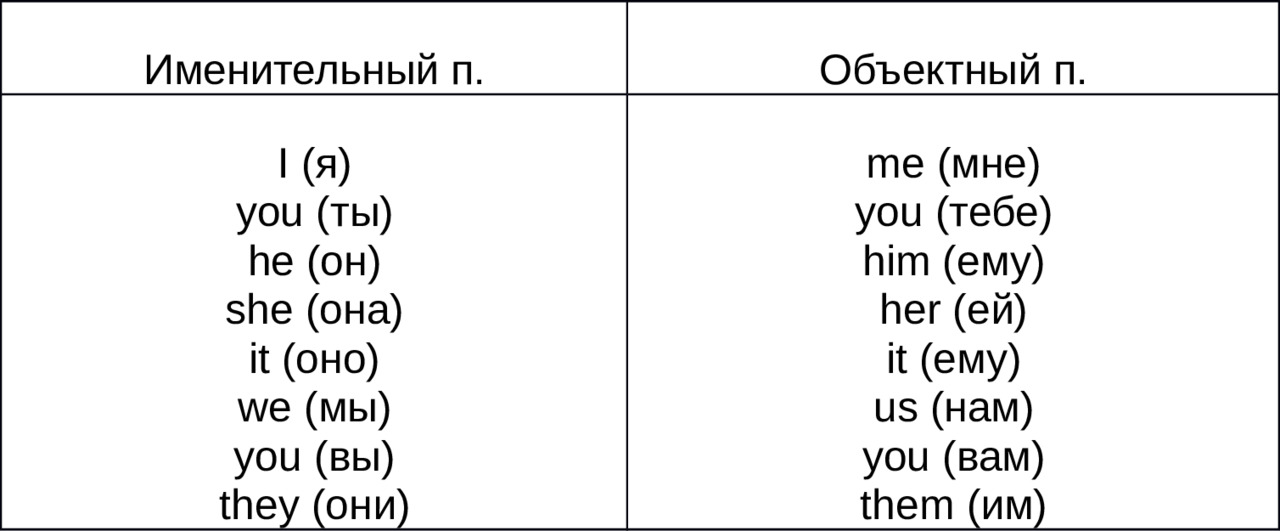
После местоимения you глагол-сказуемое всегда стоит во множественном числе. You are at home.
Личные местоимения в именительном падеже являются подлежащим, в объектном падеже — дополнением. I told her about the voyage. He looked at us and went out.
Притяжательные местоимения
Possessive pronouns
Притяжательные местоимения имеют две формы: основную и абсолютную.
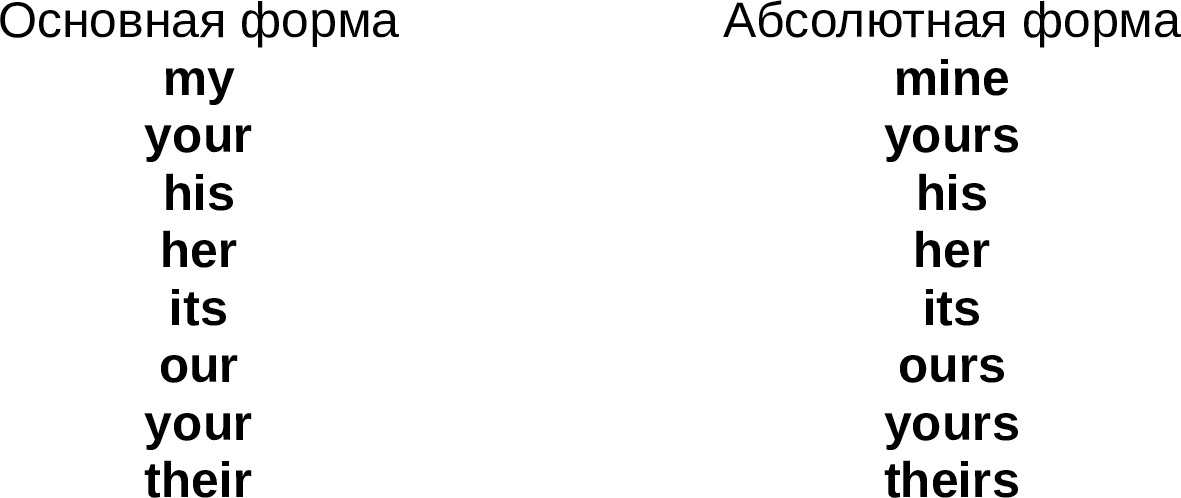
Is it your car? — Yes, it is mine.
Притяжательные местоимения согласуются с определяемым существительным в числе, а для существительных 3 лица единственного числа и в роде.
The book is her.
The book and the notebook are hers.
Указательные местоимения
Demonstrative pronouns
this — этот, эта, это;
these — эти;
that — тот, та, то;
those — те;
such — такой, такая, такое, такие.
This book is very interesting.
Вместо определяемого существительного после this или that можно употреблять слово one, а после these или those — ones.
This book is the one I wanted.
These apples are not good, take those ones.
Вопросительные местоимения
Interrogative pronouns
Who — кто; what — что, какой, какая, какое, какие; whose — чей; which — который.
Местоимение who имеет два падежа: именительный — who (всегда подлежащее) и объектный — whom (всегда дополнение).
Who is here? (Кто здесь?)
Whom do you see? (Кого ты видишь?)
Вопросительное местоимение может употребляться с предлогом перед местоимением или после него в конце предложения.
About what are you speaking?
What are you speaking about?
Местоимение who в вопросе о каком-либо человеке означает: Кто он? Как его зовут? Местоимение what в подобном вопросе означает: Кто он по профессии?
Who is she? — Как ее зовут?
What is she? — Кто она по профессии?
Относительные местоимения
Relative pronouns
Who, which, that — который/ая/ое/ые
Whose — чей, чья, чье, чьи
Употребляются для связи придаточного предложения с главным.
I saw the man who was his enemy.
Mike took the chalk which was here.
Местоимение who (whom) употребляется по отношению к человеку, which — к предметам и животным, that, whose — в обоих случаях.
This is my brother whom I told this story.
The boy who is playing is my son.
«This is the house that Jack built.»
Возвратные местоимения
Reflexive pronouns
Образуются прибавлением окончаний –self (ед. число) и –selves (мн. число) к личным и притяжательным местоимениям.

I opened the door myself.
The child read the book himself.
She wrote the letter herself.
They liked to do everything themselves.
Неопределенные и отрицательные местоимения
Indefinite and negative pronouns
some/any — какой/ая/ое-нибудь, либо
somebody/someone — кто-то
something — что-то
anybody/anyone — кто-то, кто-либо, кто-нибудь
anything — что-то, что-нибудь, что-либо
nobody/ no onе — никто
nothing — ничто
one — любой
Притяжательный падеж местоимений образуется прибавлением окончания ’s: somebody’s, anybody’s, one’s.
This is somebody’s bag. — Это чья-то сумка.
К неопределенным местоимениям относятся также: all, each, either, neither, both, none, much, many, little, few. Местоимения a few, a little, much, many могут употребляться вместо some. Have you any flowers? — I have some (a few) flowers. (исчисляемые существительные) Have you any milk? — I have some (a little) milk in a bottle. (неисчисляемые сущ.)
Местоимения some, somebody, something, someone употребляются в утвердительных предложениях; any, anybody, anything, anyone — в вопросительных и отрицательных; no, nobody, nothing, no one — в отрицательных.
I see something on the table.
I see nothing on the table.
I don’t see anything on the table.
Do you see anything on the table?
Если в отрицательном предложении глагол имеет отрицание not, вместо отрицательного местоимения употребляется неопределенное местоимение any, anybody, anything, anyone.
I don’t know anything about him.
I know nothing about him.
Местоимение one может употребляться:
— чтобы избежать повторения определяемого существительного;
— в значении «каждый», «всякий», «любой».
This book is the one I wanted.
One must know that it’s dangerous.
1. Use the pronouns: some, any, no. Помни, что some употребляется в утвердительных предложениях, а any в вопросительных и отрицательных.
1. There are… stools in the kitchen. 2. Is there… little table in the bedroom? No, there isn’t …. There is… little table in the bathroom. 3. It is so cold that there are… people in the street. 4. Have you… bookshelves on the walls? 5. Are there… pictures in your English book? 6. There are… maps on the walls of the classroom. We have geography lessons in it.
2. Form the pronouns. Помни, что местоимения some, any, no, а также every встречаются не только самостоятельно, но и в составе слов в сочетании с body, one, thing, where.
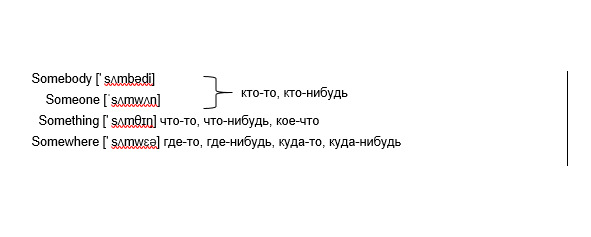
3. Read and translate:
1. There is somebody there. 2. Someone is near your car. 3. I have something in my hand. 4. My book is somewhere at home. 5. I am afraid there is someone in the garden. 6. I am afraid he knows something important and he does not want to say this.
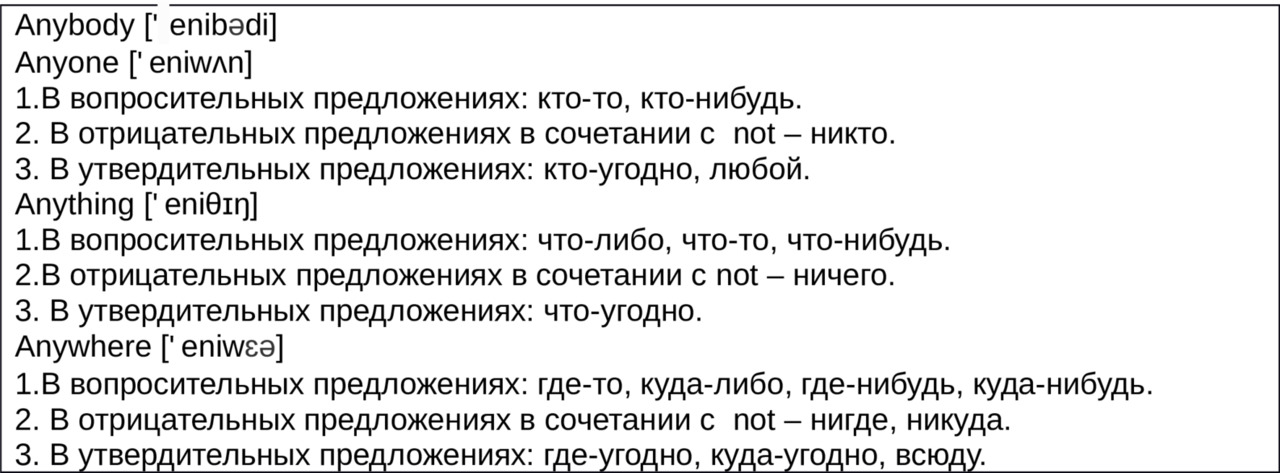
4. Read and translate.
1. Is there anybody in the kitchen? 2. There is not anybody in the dining-room. 3. Anyone can answer this question.4. Is there anything on the stove? 5. There is not anything on the shelf. 6. You may take anything you like. 7. Does your father go anywhere this summer? 8. He doesn’t go anywhere this month. He stays at home. 9. You may go anywhere you like.
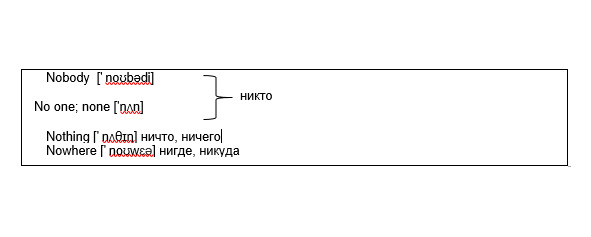
5. Read and translate.
1. Nobody knows where Nick lives. 2. None of them can speak French. 3. I am afraid there is nothing on the table. 4. Where are you going? Nowhere.
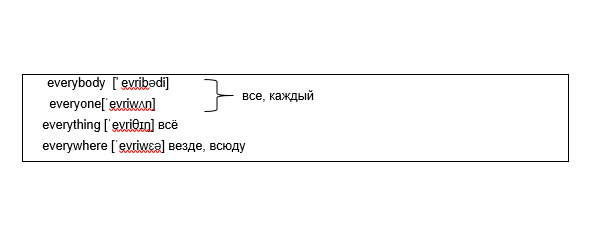
6. Read and translate.
1. Everybody is present today. 2.You may ask everyone to help you. 3. We understand everything in this text. 4. You can find this book everywhere.
7. Use the necessary pronouns.
a) Something, anything, everything, nothing.
1. There is… black on the floor. 2. Don’t tell her… about me. 3. I can see… there, it is so far. 4. … is all right. You may go home.
b) somebody, anybody, nobody, everybody.
1. … is waiting for you, Mother. 2. Is there… in the room? No, there is not …in the room. 3. I can see… there. 4. Is… absent today? No, … is present.
8. Fill in the necessary pronouns.
1. Have you… English books in your library? 2. There are… students in this room. It is empty. 3. Please, give me… milk out of this jug. 4. Take… more cheese. It is good. 5. This man cannot give you… information because he is a stranger here. 6. Can you see… in that cupboard? 7. There is… white in that jug. 8. Have you spoken to… today? 9. There is… who wants to talk to you. 10. … knew that he had left the town. 11. Have you… English books at home? No, I haven’t. 12. … dropped this note into my letter-box. 13. You could not tell… about it. 14. — Have you… to read? — Take… book you like.
9. Use the pronouns (he, she, it, they, we, I) instead of the predicate.
1. My mother is a worker. 2. Our friends are always busy. 3. The cat is rather small. 4. Mike is the best pupil in our group. 5. My family is not very large. 6. The pen was broken.
10. Translate the sentences in two ways. e.g: I sang nothing at the concert. I didn’t sing anything at the concert.
1. Я ничего не вижу здесь. Слишком темно.
2. Он не может сделать ничего для тебя.
3. Места были слишком плохие. Мы не могли ничего видеть на концерте.
4. Ты ничего не можешь сказать об этом.
5. Я не могу никого видеть здесь.
6. Мне нечего сказать.
11. Use the pronouns: mine, yours, his, her, ours, theirs.
1. That is our classroom. That classroom is ….2. This is your ice- cream. This ice- cream is ….3. This is my sister’s money. This money is … 4. That is the ninth form’s basketball team. This team is ….5. Those are my birthday presents. Those birthday presents are ….6. This is my father’s present. This present is ….
12. Read and give short answers using: mine, yours, his, her, ours, theirs, its.
I. Whose book are you holding, yours or your friend’s? 2. Whose hair is darker, yours or your mother’s? 3. Your bag is in your desk. Where is your friend’s? 4. Whose desk is in the corner of the classroom, yours or your friend’s? 5. Whose family is bigger, yours or your sister’s? 6. What colour are your eyes? And your father’s?
Прилагательное -The adjective
Прилагательное обозначает признак предмета (a cold day, black hair) и имеет три степени сравнения: п о л о ж и т е л ь н у ю (positive degree), с р а в н и т е л ь н у ю (comparative degree) и п р е в о с х о д — н у ю (superlative degree).
У односложных прилагательных сравнительная степень образуется при помощи суффикса –er, превосходная –est, которые добавляются к основе формы положительной степени.
cold — colder — the coldest
near — nearer — the nearest
У многосложных прилагательных сравнительная степень образуется при помощи слова more, а превосходная –the most.
interesting — more interesting — the most interesting
Если прилагательное в положительной степени оканчивается на –y, то окончание в сравнительной степени будет –ier: easy — easier; в превосходной –iest: easiest; а если на –e, то –e опускается: nice — nicer –the nicest.
Исключения:
good — better — the best
bad — worse — the worst
little — less — the least
much, many — more — the most
Для сравнения различных предметов употребляются конструкции as… as, not so… as, слово than:
He is taller than his father is.
He is as tall as his brother.
He is not so tall as his brother.
1. Answer the questions.
1. Which is better, to go in for basketball or tennis? 2. Who is the strongest sportsman in our country? 3. Where is the most beautiful country-side in your place? 4. Which takes more time, to travel by car or by train? 5. Where is the coldest climate in our country? 6. Which are the most popular sports in our country? 7. Who is your favourite actor (actress)?
2. Form the Degress of Comparison of the adjectives.
Big, bad, dark, good, late, patient, primitive, high, low, small.
3. Answer the questions.
1. Who is your best friend? 2. Where is the nearest bus stop here? 3. What is the shortest month in a year? 4. Who is taller, you or your mother? 5. What is more difficult for you, to read or to speak English? 6. Who is the oldest in your family? 7. Who is younger, you or your cousin?
4. Use the necessary Degrees of Comparison.
1. Winter is (cold) than spring. 2. Moscow is (big) than Tver. 3. The train is (slow) than the plane. 4. Summer is the (nice) of the four seasons. 5. The Volga is (long) than the Neva. 6. This house is (beautiful) than that one. 7. That is the (difficult) question.
5. Finish the sentences.
1. I am as… as… (old). 2. Our town is not so… as … (big). 3. Weather in winter is not so… as… (warm). 4. My friend is as… as … (short). 5. This boy is as… as … (tall). 6. January is as… as … (long). 7. English is as… as … (difficult).
6. Количественные прилагательные.
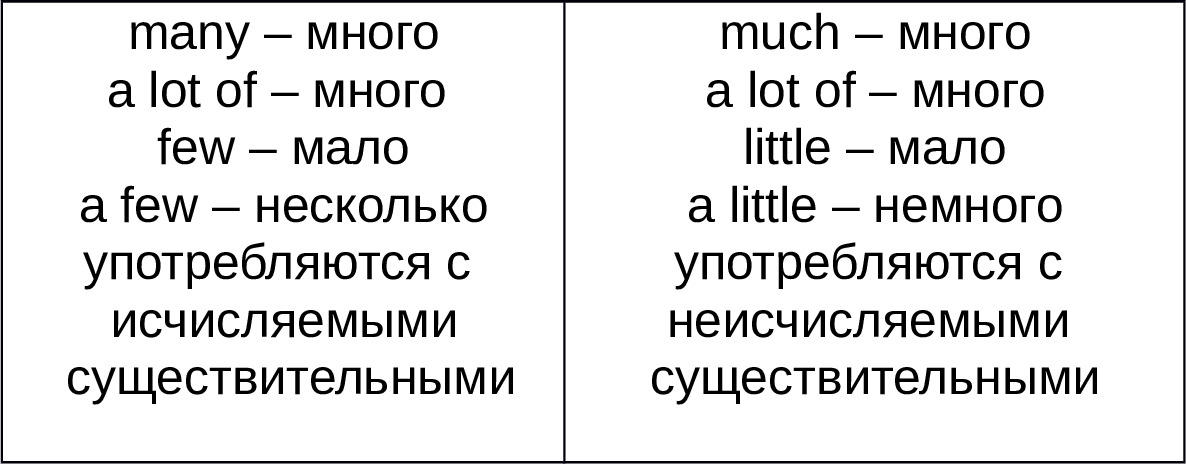
1. There are very (many, much) people in the restaurant. 2. There isn’t (many, much) wine in the bottle. 3. Is there (many, much) coffee in the cup? 4. Give me (a few, a little) traveller’s cheques. 5. Give me (a few, a little) coffee. 6. There are very (many, much) visitors in Moscow now. 7. (A few, a little) passengers are going to the Departure Control. 8. He had (a little, a few) luggage with him. 9. Will you give me (a few, a little) beer, please? 10. There are very (few, little) restaurants in the street.
7. Write the Degrees of Comparison.
Old, big, new, fast, tall, strong, small, cheap, messy, expensive, beautiful, comfortable.
8. Read and answer the questions.
1. Which is the coldest month in the year? 2. When is it hotter, in July or in August? 3. Is June as long as July? 4. When are the nights shorter than the days? 5. Is September as rainy as October or isn’t it so rainy? 6. Which is the most beautiful season in your place? 7. Is summer sunnier this year than it was last year? 8. Which exercise is more difficult for you, this one or Exercise 44?
Наречие — The Adverb
Наречие — часть речи, которая обозначает признак действия или предмета.
Наречия делятся на простые, производные и сложные.
1) Простые наречия — soon, fast, here, there, then, when, why и т. д.
2) Производные наречия образуются с помощью суффикса –ly:
bad (плохой) — badly (плохо)
usual (обычный) — usually (обычно)
day (день) — daily (ежедневно)
part (часть) — partly (частично), при этом: если прилагательное оканчивается на –y, то y меняется на i (easy — easily); если прилагательное оканчивается на –le, то e опускается (simple — simply).
3) Сложные наречия образуются путем словосложения: sometimes (иногда), meantime (тем временем), anyway (так или иначе), midway (на полпути), overhead (наверху), at least (по крайней мере), at first (сначала), in vain (напрасно).
Степени сравнения наречий образуются с помощью слов more (сравнительная степень) и the most (превосходная степень) или окончаний –er, -est (в односложных наречиях).
early — earlier –the earliest
brightly — more brightly –the most brightly
Исключения:
well — better –the best
хорошо — лучше — лучше всего
badly — worse –the worst
плохо — хуже — хуже всего
far — farther –the farthest
далеко — дальше — дальше всего
Местоимения here (здесь), there (там), now (теперь), then (тогда, как), thus (таким образом), степеней сравнения не имеют.
По своему значению наречия делятся на наречия:
— в р е м е н и:
now (сейчас), yesterday (вчера), tomorrow (завтра), then (тогда), before (раньше), since (с тех пор), always (всегда), sometimes (иногда) и т. д.
— м е с т а:
here (здесь, сюда), there (там, туда), far (далеко), back (назад), within (внутри), outside (снаружи) и т. д.
Наречие somewhere употребляется в утвердительных предложениях, anywhere — в вопросительных и отрицательных.
I think I’ve met you somewhere.
Did I meet you anywhere?
— о б р а з а д е й с т в и я: quickly (быстро), slowly (медленно), fast (быстро), well (хорошо);
— м е р ы и с т е п е н и: very (очень), almost (почти), hardly (едва), too (слишком), little (мало), just (точно, как раз).
Наречия выполняют вспомогательную роль вопросительного слова: where? why? how? when?
Well может быть прилагательным и наречием:
She studies well. — Она учится хорошо. (наречие)
She is well. — Она чувствует себя хорошо. (прилагательное)
1. Form the Degrees of Comparison of Adverbs.
Near, far, well, badly, much, little, bravely, lovely.
2. Find the adverbs:
(Прилагательное — какой, какая, какое, какие? Наречие — как?)
a) 1. You must work hard.
2. His life was very hard.
b) 1. They took a fast train to Novosibirsk.
2. You speak English too fast. I can’t understand you.
c) 1. We are having much snow this winter.
2. He reads very much and prefers historical novels.
d) 1. Alec’s answer was the best.
2. I like this film best of all.
3. Find the adjectives and the adverbs.
1. Lena, it’s late, you must go to bed. 2. It is the daily newspaper. 3. He visited the post-office daily. 4. In 1957 he lived in the Far East. 5. We never come late for our classes. 6. How far do you live from your school? 7. The moon was high in the sky when they returned home from the concert. 8. «Who can jump so high?» asked the teacher.
4. Find the adjectives and the adverbs.
1. The actress wore a long dress and looked tall. 2. The engineer stayed long at his work to finish his task 3. They were met more warmly than before. 4. The girl works at her Physics hardest of all the subjects.
5. Answer the questions.
1. How did you spend last Sunday? 2. Which do you like more, hiking or travelling by bus? 3. Who swims best in your class? 4. Do you get up earlier or later than 7 o’clock? 5. Do you get to school quicker than your friend? 6. Who speaks English most correctly in your class? 7. How do you usually have your breakfast, quickly or slowly? 8. How did you have your breakfast yesterday, slower than usually or quicker?
6. Translate.Use the adverbs.
1. For nearly an hour they were singing quietly in the other room. 2. We had hardly any rain last summer. 3. He must work hard now. 4. I work hard at my English, but Pete hardly works at all. 5. I live near my school. 6. There are nearly 3000 students there. 7. It is nearly 5 o’clock. We must finish our work.
7. Transform the adjectives into the adverbs with the help of the suffix — ly.
Real (действительный)
Really (действительно)
Rapid, faithful, complete, steady, pleasant, comfortable, kind, attractive, safe, probable, full, happy, usual, official.
8. Use the necessary form.
1. You must work (hard). 2. He speaks English too (fast). 3. He knows English (good) than you. 4. She is the (capable) student in our group. 5. I like this film (good) of all. 6.We went home (quick). 7. He was (warm) dressed. 8. February is the (short) month in a year. 9. It is a (daily) newspaper. 10. How (far) do you live from your school?
9. Translate (the adjectives-the adverbs).
1. Дом, действительно, очень маленький. 2. Oн, возможно, встретит его завтра.3.Спрос на эти товары постоянно растет. 4. Наш экспорт быстро растет.
10. Translate (the adjectives-the adverbs).
1. The weather is warmer today. 2. I am getting cleverer and cleverer. 3. Their plan is more detailed. 4. This rule makes us be more careful. 5. We went more and more slowly. 6. He makes mistakes more often. 7. The idea is less easily understood. 8. She is older than me. 9. They analyzed the problem more thoroughly than we did. 10. The shorter the days, the longer the nights.
11. Сhoose the adjectives or the adverbs.
1. Did you have a good trip? Yes, it was (pleasant, pleasantly). 2. The profits of the Company are (steady, steadily) increasing. 3. There is a (steady, steadily) demand for these goods. 4. The quality of these goods is (high, highly). 5. Please, send us (full, fully) information on the problem. 6. He will (probable, probably) make an appointment for Wednesday. 7. He speaks French (fluent, fluently) enough to take part in the talks. 8. It’s a (complete, completely) new method.
12. Translate.
1. Actions speak louder than words. 2. These methods are more effective. 3. The more you read, the more you know. 4. The less attentively you listen, the less you hear. 5. The more people you know, the less time you have to see them. 6. The sooner you do it, the sooner you will go. 7. The causes of events are more interesting than the events themselves. (Cicero) 8. The more you have, the more you want. 9. My boy-friend is much older than me. 10. This book is far more interesting. 11. He made fewer mistakes. 12. We shall have far less time to do it.
13. Write the adverbs in the necessary form.
1. The cold wind is blowing… today than it did yesterday. (strongly) 2.The pupils on duty come to school… to prepare the classroom for lessons. (early) 3. Who can run …, you or somebody else in your class? (fast) 4. Which do you like …: hockey, football or basketball? (much) 5. The sun shone as… yesterday as today. (brightly) 6. Who will come …, your father or your mother? (soon)
Числительное — The Numeral
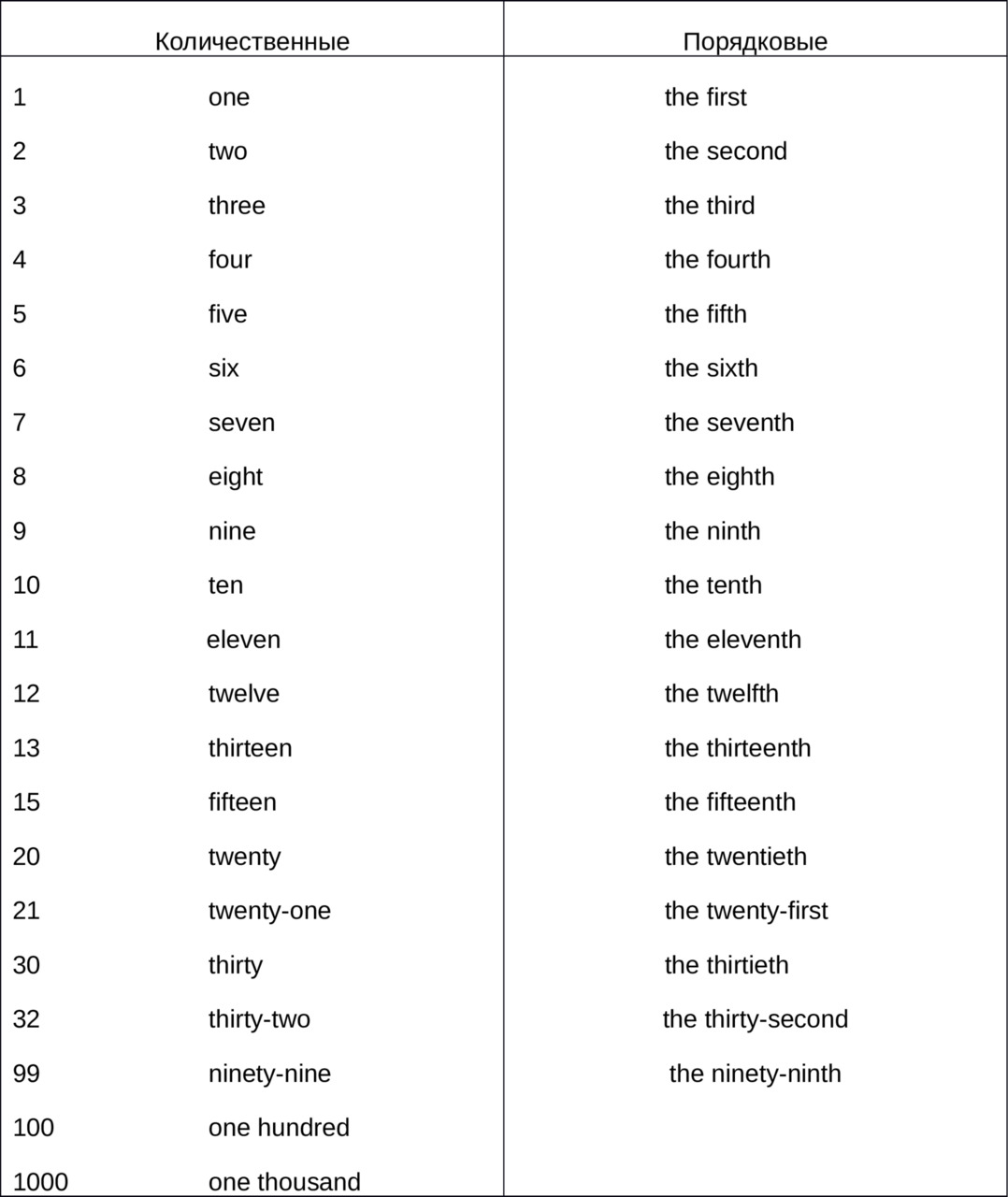
Числительные с 13 до 19 образуются путем прибавления окончания –teen. Числительные 50, 60 и т. д. образуются путем прибавления окончания –ty (fifty, sixty, seventy). Порядковые числительные образуются прибавлением окончания –th к количественному числительному — fifth, tenth (исключение — first, second, third). В порядковых числительных после 20 изменяется только вторая часть: twenty-first, fifty-second.
Числительные 100 (one (a) hundred) и 1000 (a thousand) не имеют множественного числа.
102 — one hundred and two
304 — three hundred and four
1002 — one thousand and two
Сложение:
6 +2 = 8 Six and two is eight.
Вычитание:
10 — 5 = 5 Five from ten is five.
Умножение:
2 x 2 = 4 Two times two are four.
Деление:
8: 2 = 4 Eight by two is four.
Для обозначения номеров домов, телефонов и времени употребляются количественные числительные.
I opened the book on page 99. (on page ninety nine)
His telephone number is 181-71-94. (one-eight- one-seven-one-nine-four)
What time is it?
It’s 10 a.m. — Сейчас 10.00.
It’s 10 p.m. — Сейчас 22.00.
It’s 10 min. past 8. — Сейчас 8.10.
It’s 10 min. to 8. — Сейчас без 10 минут 8 (7.50).
1. Read the numbers.
A: 3, 13, 33, 40, 14, 7, 1, 11, 55, 5, 10, 2, 88, 90, 19, 12, 15, 20, 4, 79, 16, 31, 18, 17, 66.
B: 100; 102; 1 000 000; 1 376; 247; 10 003; 1000; 389; 52; 110.
2. Read the numbers of the telephones.
13—10; 45—76; 20—89; 44—22; 10—99; 63—37; 1-17-55; 3-80-77; 2-88-45; 33—33; 4-99-00; 5-67-01; 289-44-25; 136-00-77.
3. Do the sums.
17+3=;100:25=;105×3=;3963:3=;
38—18=;15×5=;785—371=;20×100=;
14—6=;60:5=;250:50=;3189+1100=;
3+13=; 9×7=;570+735=;1000—34=
4. Name the numerals as Cardinal and then as Ordinal.
Chapter 1-the first chapter; Chapter 3; Lesson 12; Part 2; Page 371; Book 1; Part 5; Lesson 22; Page 80: Chapter 13; Page 100: Lesson 8; Chapter 43.
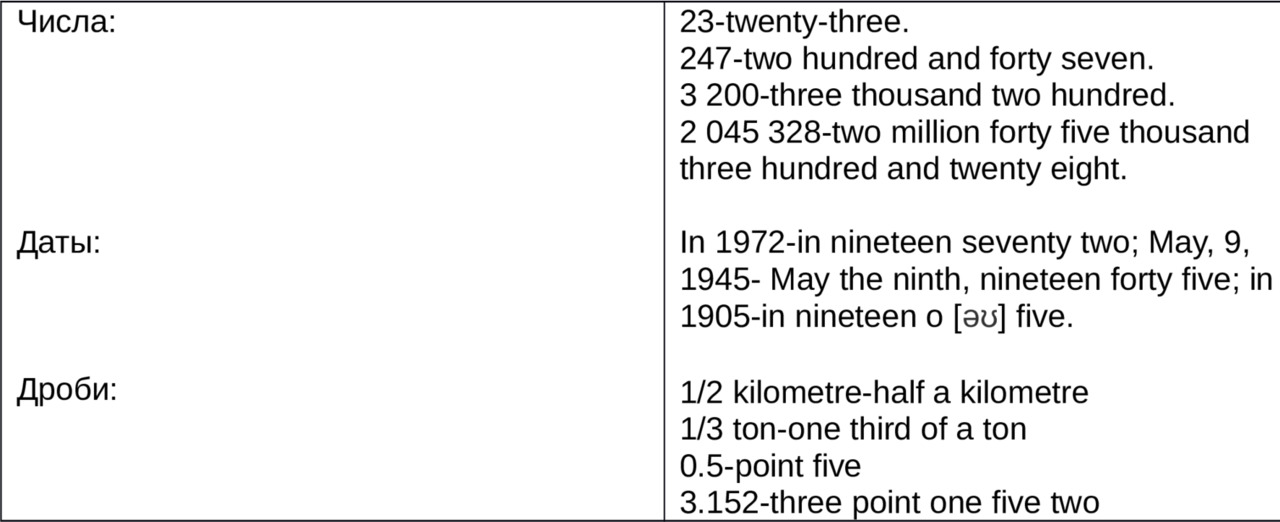
5. Read a) 5; 15; 3; 13; 30; 51; 18; 11; 12; 20; 74; 112; 201; 946; 698; 10 575; 576; 276; 7 000 000; 1 022; 0.85; 5.3; ½; ¼;2/3;1 1/2; 2 5/6.
b) 1,005 magazines; 506 students: 4,790 specialists; 5 400 000 books; 675 miles; 1,43 kilometres; 627 roubles; on page 733; by bus 9; by tram 27; in room 218; on the 12th day.
c) on the 1st of May; on January 18th, 1967; on November 7th, 1947; at the end of 1789; October 25,1917; 1903; at the beginning of 1970.
d) 5.4 tons; 2/3 of a kilometre; 0.2 mile; 2.75 tons.
Время — Time
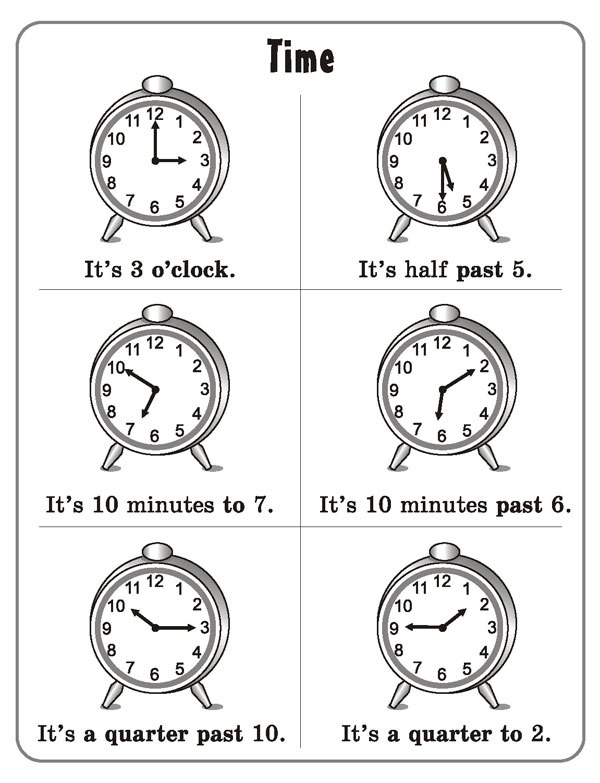
A Test
1. Write the plural of the Nouns:
Child, toy, tooth, theatre, potato, knife, baby, woman, mouse, sheep, knowledge, lake, information.
2. Use the correct articles.
1. Have you got… pen, please? 2. Have you got… matches, please? 3. Do you want… biscuit? 4. We are showing… film now. It is… American film. 5. I am going to… Italy. 6. Take… armchair and sit down. 7. There is… cheese on the table. 8. Look at… second sentence. 9. It is… coldest month of the year. 10. It is… cat. … cat is white.
3. Use the necessary pronouns.
1. Have you got… Russian books? 2. There are… desks in the classroom. 3. Take… more cheese. 4. There is… black on the floor. 5. There is… who wants to see you. 6. Take… book you like. 7. I can see… there. It is too far. 8…. can answer this question. It is so easy.
4. Write the Degrees of Comparison of the adjectives and adverbs.
Big, tall, messy, comfortable, busy, hot, slow, good, expensive, bad, popular, well, far.
5. Use the necessary Degree of Comparison.
1. Summer is the (hot) season of the year. 2. Winter is (cold) than spring. 3. I am as (young) as my friend. 4. This dress is (beautiful) than that one. 5. Pete is the (clever) pupil in our class.
6. Use the adjective or the adverb.
1. The weather was (pleasant, pleasantly).
2. He is rather (high, highly).
3. He will (probable, probably) make a mistake.
4. She is (neat, neatly) dressed.
5. Who will give us (full, fully) information?
7. Write the time.
7.00; 5.15; 6.45; 2.30; 8.40; 10.35; 12.10; 3.45; 1.55; 4.10; 9.50; 11.25.
Настоящее простое время — The Present Simple Tense (Indefinite)

1. Fill in the table. Ask questions to the sentences. (Помни, что глаголы to be и to have выносятся вперед при составлении вопросов).
I am a pupil. Am I a pupil?
He has a dog. Has he a dog?
С остальными глаголами при составлении вопросов используй вспомогательные глаголы do и does.
1. He is a teacher. 1 …? Yes, ….
No,…..
2. Who….?
3. What …?
2.She has a cat. 1 …? Yes, ….
No, ….
2. What ….?
3. When …?
3.I do my morning exercises every day. 1 …? Yes, ….
No, ….
2. Who ….?
3. When …?
4. He goes to school every day. 1 …? Yes, ….
No,….
2. Who….?
3. When …?
5. They live in Moscow. 1 …? Yes,….
No,….
2. Who….?
3. Where …?
Общие вопросы- General questions

2. Ask general questions to the sentences.
1. I live in Moscow Street. 2. He reads English books. 3. They go to school. 4. She works at a factory. 5. We speak French. 6. He does morning exercises.
Специальные вопросы — Special-questions

Вопросительные слова
How — как?
What kind of — какой?
What colour — какого цвета?
For how long time — сколько, как долго?
Whom — кому? кого?
Whose — чей?
Which — который?
When — когда?
Why — почему?
How many — с исчисляемыми -сколько?
How much — с неисчисляемыми -сколько?
3. Ask questions to the underlined words.
1. She speaks English fluently. 2. My parents work at a factory. 3. These students study well. 4. These young people learn two foreign languages. 5. This story is very interesting.
Настоящее простое время используется 1) для выражения действия, которое совершается постоянно (regularly), обычно (usually), часто (often), редко (seldom), всегда (always), иногда (sometimes), каждый день, месяц, год (every day, month, year)
2) В определениях, формулировках правил, законов, пословицах, поговорках, т.е там, где утверждается что-то истинное вообще. He laughs best who laughs last. -Хорошо смеется тот, кто смеется последним.
3) Для выражения будущего действия, которое намечено и обязательно состоится. I go out in Kiev early morning. -Зaвтра с утра я уезжаю в Киев. Глагол в Present Simple (Indefinite) Tense имеет форму инфинитива без частицы to, только в 3 лице единственного числа к глаголу прибавляется окончание -s, -es.
В 3 лице единственного числа окончание -s читается различно:
1.После глухих согласных [s]: to meet-meets
2. После звонких согласных и гласных [z]: to come-comes
3. Глаголы, оканчивающиеся на свистящие и шипящие звуки принимают окончание -es [iz]: finish-finishes
4. Read the verbs. Remember the rule.
Goes, comes, shows, reads, makes, teaches, thinks, wins, writes, swims, pays, forgets, hurts, begins.
5. Fill in the verbs in the necessary form.
1. Pete (to go) to school. 2. I (to work) in a shop. 3. Mike (to read) English books. 4. He (to clean) the blackboard. 5. They (to live) in Moscow. 6. Our manager (to read) letters every day. 7. Mr. Brown (to be) the husband of Mrs. Brown.
6. Answer the questions.
1. Do you play tennis? 2. Do you take English lessons? 3. Does your brother go to school? 4. Does Ann read English books? 5. Do you often do morning exercises? 6. Does your mother seldom work in the garden? 7. What does your father like to do? 8. How often do you go to the cinema? 9. When do you work in the library? 10.Till what time are you busy in the office?
7. Ask 3 questions to each sentence.
Model: I get up at 8 o clock in the morning.
1. Do I get up at 8 o’clock in the morning?
2. When do I get up?
3. Who gets up at 8 o’clock in the morning?
My brother lives in Kiev.
1. Does my brother live in Kiev?
2. Where does my brother live?
3. Who lives in Kiev?
1. In the evening Mr. Ford works in the garden. 2. Her friend lives in Riga. 3. You always do your morning exercises. 4. After dinner they usually go for a walk. 5. Our pupils have dinner at home. 6. Lucy is seldom busy till 6 o’clock. 4. Mary goes to her office by tram.
8. Fill in the verbs to have or to be.
1. … he a lot of books? -No, he… not. 2. They …in Paris. 3. My brother… a nice cat. 4. … you a sister? 5. … John a good chap? 6 … your brother middle-aged? 7. My brother… here.
9. Answer the questions.
1. Have you a sister? 2. Where is your father? 3. Is he middle-aged? 4. Have you a lot of friends? 5. Are you Russian?
10. Write general questions to the sentences.
1. I am a student. 2. He has a lot of books at home. 3. He is Russian. 4. We have our English lessons in the morning. 5. They are businessmen. 6. She has got many toys. 7. We have a lot of lessons at school every day. 8. We are pupils at school number 3.
11. Ask all possible questions.
1. He speaks English fluently. 2. My flat is very large. 3. He does his homework in the evening. 4. The postman brings us letters and newspapers. 5. Our class is very comfortable.
12. Answer the questions.
1. How often do we have English classes? 2. When does your family have dinner? 3. How do you get to school? 4. When do your parents return home from work? 5. Who takes care of you when you are ill? 6. It often rains in spring, doesn’t it? 7. Your friend does not know French, does he (she)? 8. Does your friend have his (her) birthday this month?
13. Ask questions to the underlined words.
1. I learn English. 2. My sister goes to school. 3. Our family lives in Moscow. 4. They help their mother about the house. 5. His father knows many languages.
14. Translate into English.
1. Он часто читает английские журналы. 2. Мы ходим в школу каждый день. 3. Я хорошо играю в шахматы. 4. У меня есть друг. 5. Ты ученик или уже студент? 6. Она делает домашнее задание утром. 7.Мой папа хорошо говорит по-французски. 8. Они всегда опаздывают.
15. Ask questions to the sentences, beginning with the words in the brackets.
1. Her hobby is musiс. (What)
2. She speaks several foreign languages. (Who, How many languages)
3. I study Geometry at school. (Who, What, Where)
4. We have Russian lessons 4 times a week. (Who, How many times a week, What kind of lessons)
5. They prefer juices to coke. (Who, What)
6. Peter has a mother, a father and a sister. (Who)
7. Father likes to watch TV in the evening. (Who, When)
8. Mary’s friends are in Moscow now. (Whose friends, Where)
16. Write the sentences in the negative form.
1. I always sleep well. 2. Father listens to the radio before he goes to work. 3. We have coffee for breakfast. 4. He does his morning exercises at a quarter past seven. 5. It rains in June here. 6. They learn English.
17. Write the sentences in the interrogative form, beginning with the words in the brackets.
1. She helps her mother to clean the room. (What…) 2. She lives in a village not far from the Volga. (Where…) 3. The children like to listen to their father’s stories. (Whose…) 4. On Sundays the family goes for walks in the woods. (When…) 5. The teacher calls the pupils to the blackboard to answer her questions. (Whom…) 6. We have a meeting before May Day. (What)
Оборот there is (are) — есть, находится
Оборот there be служит для выражения наличия (либо отсутствия) какого-либо предмета в определенном месте.
There is a book on the desk. — На парте книги.
There are students in the room. — В комнате студенты.
При перечислении нескольких предметов в предложении с оборотом there is/are глагол согласуется в числе с первым подлежащим:
There is a table, four chairs and a sofa in my room.
There are four chairs and a sofa in my room.
При вопросе глагол выносится на первое место.
There is a sofa in my room.
Is there a sofa in my room?
There are two windows in the kitchen.
Are there two windows in the kitchen?
Краткие ответы: Yes, there is (are).
No, there is (are) not.
Специальные вопросы
What is there in the room? — Что в комнате?
How many chairs are there in the room? — Сколько стульев в комнате?
Бесплатный фрагмент закончился.
Купите книгу, чтобы продолжить чтение.
